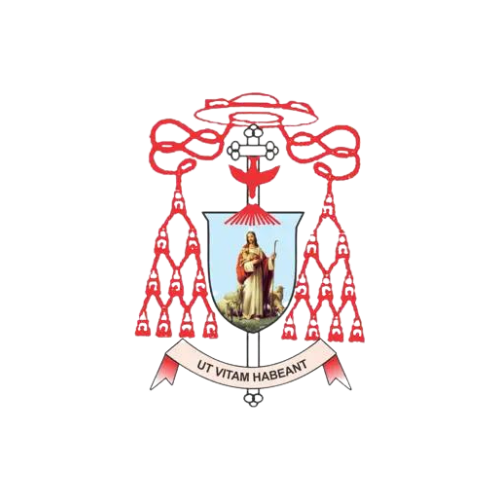Personal Reminiscence of Fr. Cyprian Michael Iwene Tansi by Fr. Robert M. Hodge ocso Mt. St. Bernard Abbey. Now in his nineties, Fr. Robert recalls his first experience in the monastery with Fr. Cyprian as a fellow novice.
Father Cyprian Iwene Tansi
Now that the Holy Father has declared Father Cyprian Tansi Venerable and decided to beatify him, it is already certain that his lifestyle and virtue were of heroic quality, and that alone is evidence of real sanctity.
For the events and facts of his life, first in Nigeria and later for thirteen years as a Cistercian monk of the community of Mount Saint Bernard in England, we are deeply indebted to the late Fr. Gegory Wareing who was his Novice Master. I have just been reading his excellent monograph about this remarkable priest novice from Nigeria. It had a special interest for me as I had worked as a priest in the diocese of Plymouth since 1931, and entered that same noviciate at the commencement of 1951, Fr. Cyprian having entered the previous year. Was this an accident or a coincidence? I don’t think so. For anyone with real faith it seemed providential. This was in the days of the Trappist regime when communication between the Brethren was discouraged; but as we were both novices and worked together in the refectory, we were able to speak to each other freely while at work. This was a great blessing in that it gave me an unrivalled opportunity to observe the strength of his character, and above all, the quality of his faith, and it is to this that I specially wish to testify. It was of course clearly implied by the remarkable facts of his life as recorded in Fr. Gregory’s book, but after reading it I realised that some of the things Fr. Cyprian told me as we worked together were worthy of explicit notification.
The thing that brought this home to me was what he said about the events that led him to become a Christian. The story goes back to the time when Nigeria was a British colony, and as Britain was primarily interested in promoting commerce, there could easily have been cases where native customs and interests would have clashed with those of the ruling colonial power. However this may have been, Fr. Cyprian’s father, for whatever reason, fell foul of the colonial authority and was sent to prison. Thus of course was bitterly resented, and his father resolved to have his son, Iwene, educated in a Christian school and a Catholic one. A pagan at the time, his motive is unlikely to have had anything to do with religion. Rather would he have been ambitious for his son’s culture and educational advancement to equip him to deal with the colonial authority on equal terms, surely a legitimate reason, even if not more than secular. But Fr. Cyprian’s reason for relating this event was pre-eminently a religious one, and dazzling with faith in God’s providential care of himself as an individual man and of his subsequent call to the priesthood and finally to Cistercian monastic life. It was the start of a wonderful saga, and for Cyprian and anyone endowed like himself with the gift of divine faith, it cast a powerful light on the way God makes use of the ordinary events of life, and even of our sins, in order to achieve His purpose.
Cyprian already saw all this in the light of faith, but did I? I doubt it. Faith I certainly had, but a faith that still needed to do a lot of growing before it could embrace the whole of human life, individual as well as general, and of history. Born in 1904 and reared in the Church of England, I became a Roman Catholic in 1924 and a diocesan priest in 1931. After working in the diocese of Plymouth for nearly 20 years, I joined the Cistercian Community of Mount Saint Bernard in February 1951, and it was here that my faith, already strong, became much more mature, precisely because the workings of God’s providence started to be much more clearly evident in my own life. Monastic life based the Rule of St. Benedict, with its emphasis on the reading of Scripture with meditation and other holy reading, was bound to bring this about, and what I learned from a brother monk like Fr. Cyprian provided me with a concrete illustration of what I read.
On the subject of faith and the workings of God’s providence, one author I was very fond of reading deserves special mention – the Venerable John Henry Newman. Faith was a subject that preoccupied him all his life, and on this the earlier writings of the Anglican period are probably the best. Of these the palm ought, in my opinion, go to the Parochial and Plain Sermons in which he presented Christianity as a faith to be lived. It was God Himself who must be the focus of our faith as revealed to us through Jesus Christ. Hence the absolute need of a personal relationship with God, and it was just this that my Brother Cistercian Cyprian Tansi so strikingly illustrated. It was mainly Newman’s sermon on ‘A Particular Providence as Revealed in the Gospel’ (Parochial and Plain Sermons Vol. 3) that enabled me, as I pondered it, to appreciate what Cyprian was already living and experiencing. He was well ahead of me and I was catching up. How often he would exclaim to me, ‘God and His ways!’ He saw the hand of God in everything and until we can do the same our faith has not yet grown to full maturity. Both Newman and Cyprian have been officially declared Venerable; may both, by the grace of God, help us all by their prayers to be as fully mature in faith as themselves.
Robert M. Hodge ocso
Mount Saint Bernard Abbey
January 19, 1998
